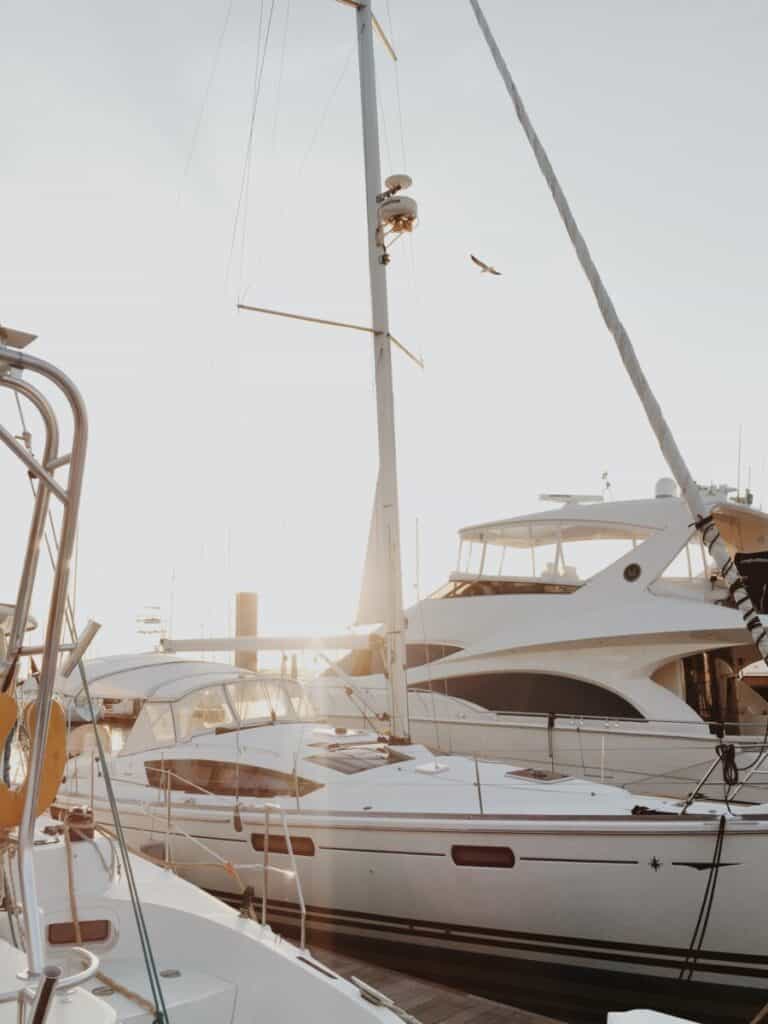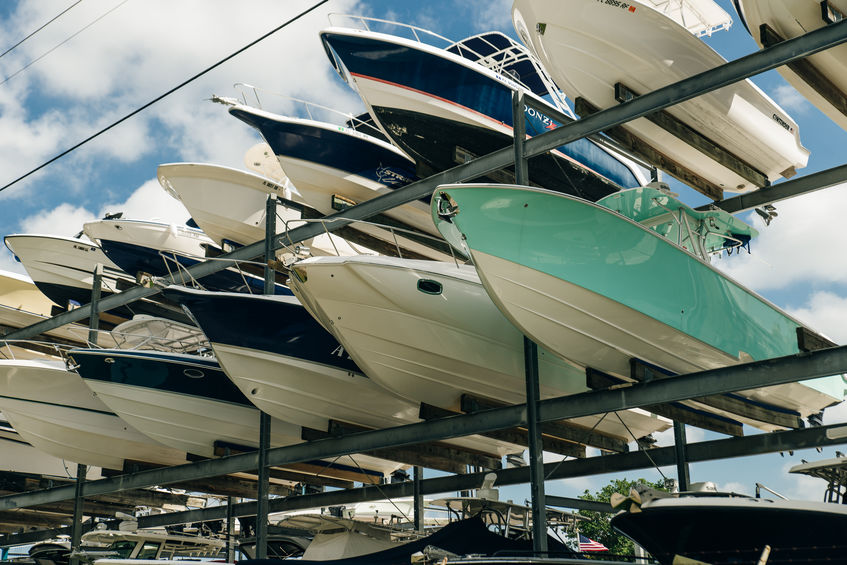Keeping your boat in your driveway isn’t anywhere near as straightforward as you might think and hope it would be.
So, before you decide to leave your pride and joy out in your driveway, there are a host of points to consider, ranging from permissions to safety.
Read on to find out the most important considerations to ensure you remain within the law, and your boat stays in perfect condition for next season.
1. Avoid Falling Foul of the Law
You could be forgiven for thinking storing your boat outside your house would be perfectly legal and straightforward to do. However, many boat owners find themselves on the wrong side of laws, regulations, and permissions required for storing oversized items in a driveway in different communities.
Suppose you want to store your boat in a driveway in front of your house. In that case, you need to do your research and determine if your property falls under the jurisdiction of any restrictions preventing you from storing recreational vehicles on your property. Some areas of the country prohibit anything other than domestic vehicles from being stored on properties.

Even if you discover there is no restriction for storing a boat on your property, your work is still not done. The next area to look into is rules and regulations that may block you from storing large items out in front of your house.
It is difficult to give a blanket guideline here since states and even individual communities will have different views.
The most common objection to parking a boat in a driveway is that such large items become eyesores for the rest of the neighborhood.
As a result, there can be time restrictions or even complete bans for keeping your boat out in the open, outside your house.
Some boat owners solve this problem by placing a fence around the area where they wish to store their boat, but this can also open up another can of worms regarding planning permissions.
To give yourself the best chance of keeping on the right side of any rules or regulations, a visit to your local authority’s planning department should give you all the information you might require.
2. Avoid Damage to your Boat
The whole idea of storing your boat close by is to keep it safe and ready to use when you want to hit the waves again. Even though your vessel remains in the same place during storage, there are still so many ways it can get damaged.
Storing a boat in your driveway leaves it more open and vulnerable to the elements than many other storage options.

Here is a list of potential pitfalls to keep in mind and protect your boat against during storage.
Moisture and mildew
Mold and mildew caused by moisture and standing water can lead to some serious repair bills. An essential step to preventing moisture problems is to thoroughly dry your boat before storing and drain it by raising the bow slightly to allow the water to run.
Keep the bow slightly raised and plug out to make sure any water that does get inside during wetter months will not accumulate.
The second simple step in mold prevention is to cover your boat correctly and use a cover made from a breathable material. The key to preventing mold is airflow, so making sure surfaces can breathe is a must.
In addition to breathable coverings, ensure sufficient space around your boat to allow air to flow as freely as possible. The area around the boat will make cleaning the surfaces more simple, which will further aid the prevention of any mold.
Internal systems damage
Saltwater causes corrosion frighteningly quickly, so ensuring you flush the engine through after use is always important, but becomes critical before storage.
For long-term storage, over the winter, you’ll also want to winterize your boat’s systems to remove the possibility of the components freezing and icing up. You can achieve this by replacing all freshwater that runs through your boat’s systems with antifreeze. Make sure the antifreeze is portable since it will be running through your drinking water system.
When mechanical components are inactive for a long time, they are at risk of seizing up. Checking oil levels (topping up where necessary) and greasing moving parts with suitable materials are sensible steps to take before storage.
Keeping the internals in top shape must be a priority.
Wildlife
The rule is simple here; No animals aboard. As much as we’d love to give shelter to some furry little creature, the boat is out of the question.
However, that’s not always an easy task. Even with a nice, secure cover, stray animals will find their way inside a boat if there’s an opportunity. Not only can wildlife damage your boat, but they can also cause hygiene problems.
Using a strong animal repellent can go a long way to keeping unwanted guests away. While a good deterrent should keep most furry visitors away, you should still take extra measures if any wildlife comes aboard during storage.
Make sure to fit appropriate covers and close all entranceways. You will also need to use steel wool to block intake and exhaust ports to stop anything from getting into the engine.
3. Avoid theft
While a boat might not seem like the easiest thing to get away with, boat thefts do happen. Even if it isn’t the boat itself that gets taken, expensive parts or components can be a lucrative target for criminals.
If you choose to leave your boat out in your driveway, it can be out in the open and on show at all times, so you need to do everything you can to deter thieves and avoid presenting them with an easy target.
The most accessible items to steal are your personal belongings and property. Fortunately, personal items are also the easiest to keep safe by simply removing them from the boat before you store it.
You should take electronics, boating equipment, fishing gear, and anything out of the interior. If it isn’t fixed to the boat, don’t leave it on board.
Take time to secure the boat itself with solid cables, chains, or whatever fastening method you prefer. Don’t forget to test all locks and bolts before leaving your boat.
For driveway storage, it is recommended to look into a secure and reliable alarm system for your boat as an initial line of defense should a thief come aboard.
Even if you don’t install a complete alarm system, floodlights and leaving your boat in a well-lit area are simple methods for putting off criminals.

Finally, don’t forget about securing your trailer and making your boat as challenging to move as possible. Boats left on trailers can be easier targets since they are already on wheels and primed for taking.
The last thing you want to do is make things easy for the thief, so take steps to keep your trailer secure and almost impossible for anybody but yourself to move.
Securing the frame to trees and using tire boots are excellent ways to keep your trailer firmly in place.
4. Avoid Regret
For many people, finances are a big driver behind the decision to store their boat at home. You own the land, so you don’t have to pay extra to use it for holding your boat, like you would with a storage yard or dock.
It is crucial to know that storing a boat on your drive is not without costs if you want to do it safely. Almost all the measures stated in this article will incur a financial fee, which quickly mounts up.
You need to factor in alarm systems, maintenance products, wildlife repellents, fixing devices, and trailer mounting equipment into the total cost before deciding that driveway storage is the best option for you.
On top of the financial cost, maintaining your boat while it is stored will incur a time cost and possibly some inconvenience attached to housing such a large item on your property.
Too many owners do not think about the impact of losing what might be a considerable chunk of space outside their homes. If that space could be better used for something else, then you need to analyze that possibility.
When you weigh up all the factors accurately, it can sometimes make more sense overall to house your boat in a dedicated storage facility instead of your driveway. Nowadays, there are multiple storage options to explore and companies are making it easier than ever for customers.
I only say these things to give you additional food for thought and highlight that you need to be certain you’ve thought about all the potential “costs,” not just the monetary ones.
5. Avoid “Forgetting” About your Boat
After taking all the steps outlined in this article to keep your boat safe and secure during storage, the last thing you want to do is completely forget about it. If the only time you touch your boat after storing it is when you’re ready to use it again, you could be in for some nasty surprises.
Despite our best efforts to prevent them, things can still go wrong. Most of the time, it will be minor problems like a hole in a cover, but these are the kinds of issues that can cause disasters if left unattended.
Stay on top of such problems by making regular checks around your boat during storage periods. For example, by putting in some extra effort to keep covers in tip-top shape, spot any water ingress and remove mold spots, you will save yourself more significant headaches down the line that could ruin a trip.
If you leave your boat on a trailer, the simple task of rotating the trailer’s wheels could save huge frustration by keeping them from bonding together and locking up.
Aside from keeping on top of problems, you will want to keep your boat clean and waxed. Even with a cover, your boat’s surfaces remain open to the elements, so they can become dirty, stained, and discolored before you know it.
As you can see, storing your boat outside must not be a “set it and forget it” kind of deal. Coming up with a regular storage maintenance schedule can be a true time-saver in the long run.
Don’t leave us yet, we gathered some similar reads for you.
Take a look and enjoy.
What Size Boats Can Fit in a Garage (Popular Examples)

